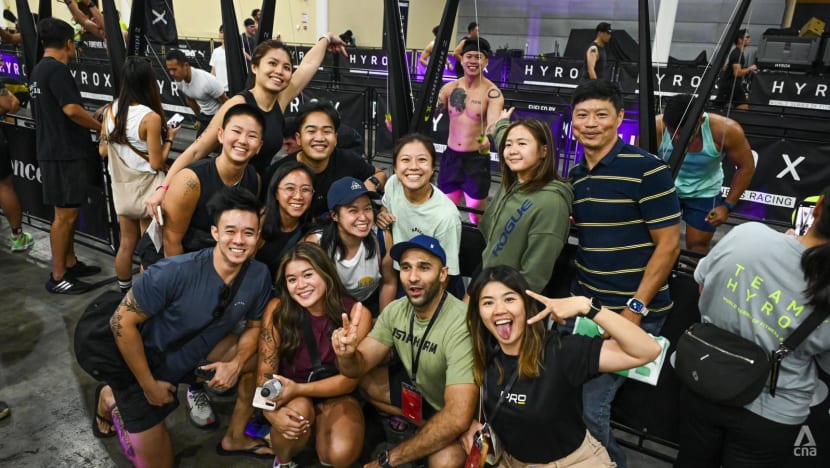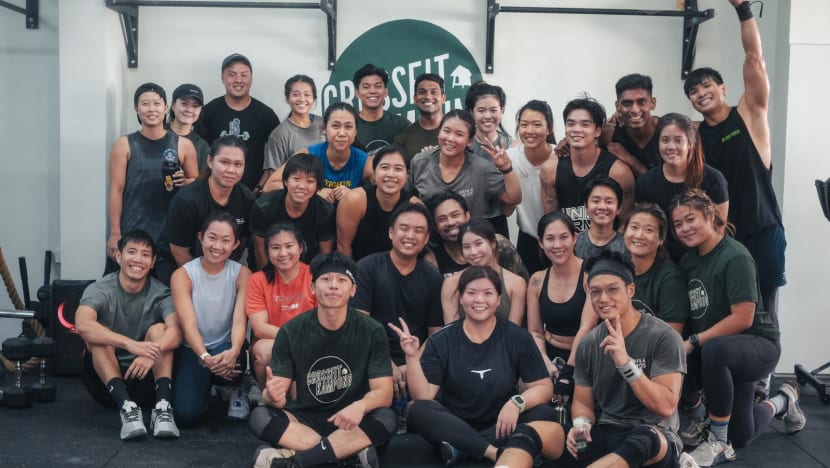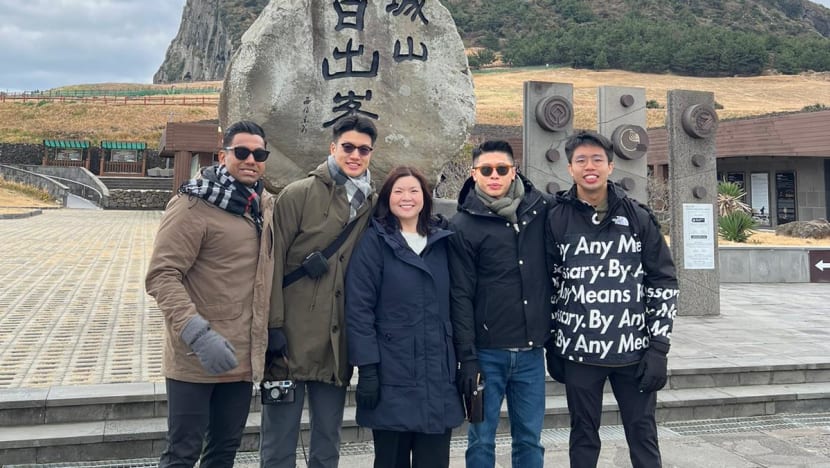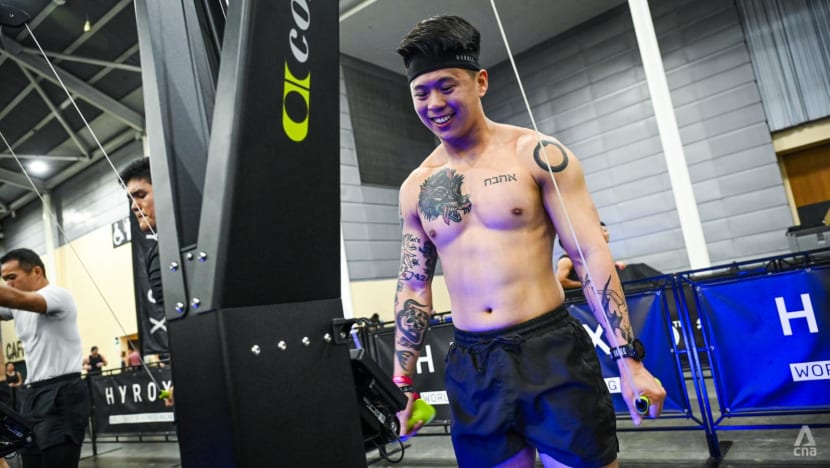Finding faith in fitness: When gyms offer more than just a workout
With their intense solidarity and strict, hyper-focused routines, group fitness classes can also seem intimidating and even “cultish” to outsiders.

Members of the CrossFit Kampung gym cheering on their head coach Tan Yi Ren (behind, topless) at the Hyrox fitness race in Singapore on Aug 31, 2024. (Photo: CNA/Syamil Sapari)

This audio is generated by an AI tool.
SINGAPORE: "Camaraderie" and "community" were foremost on Tan Yi Ren's mind when he set about opening a gym in 2020.
Hence the appropriately named CrossFit Kampung, which the owner and head coach described to CNA as "more than a fitness gym".
Mr Tan wants to improve his members’ “emotional sense" of well-being as well as their self-esteem.
When they come to his gym and together, do things they never thought they could – such as lift a certain weight – it goes beyond just a feel-good, morale-boosting factor, he said.
What it also does, he suggested, is to give his gym devotees "a little bit more faith to believe"; and an experience that carries over into spirituality as well.
Mr Tan is part of an industry that has long borrowed and incorporated such language and sentiment, as the scholar Cody Musselman pointed out in an article for The Conversation platform.
"The notion that fitness is a religion – a place where people find community, ritual and ecstatic experience – has become a common refrain."
“SAFE HAVEN”
A boom in the boutique gym scene, just before the COVID-19 pandemic, led to potential owners rushing to make their entry.
Popular franchise brands from Australia like Body Fit Training (BFT) and F45 took the lead, with over 60 branches in Singapore combined, while local contenders also emerged.
Growing enthusiasm for competitive fitness experiences also saw the two Hyrox races this year drawing around 6,000 participants, up from 3,500 at a previous outing in October.
Yet it hasn't been all rosy for the industry, with several gyms also shuttering last year as owners cited rising costs, increased competition and the fleeting nature of fitness fads.
The CrossFit Kampung gym, however, believes that its cornerstone of community is also what attracts people to join and stay, even when they could pay a lower fee elsewhere.
“We don’t just come here to work out, we come here to hang out, talk and share life experiences together,” said Mr Tan, adding that competitions like Hyrox also give members a common objective to look forward to.
His co-owner Ms Poon Shu Qi said that instead of establishing just a "professional relationship" with clients, the gym also wants to be "friends" with them.
“You can find a workout anywhere … The difference that makes you go back to the same gym is the people you work out with.”

Clara Ang, for instance, used to go to a regular gym where she found lifting weights by herself to be monotonous and unfulfilling.
She signed up for group workouts at CrossFit Kampung, and now calls it her "safe haven" free of judgment or criticism.
There, workout buddies have become close friends whom she sees more than her family.
Together these "kampung kakis", as she affectionately calls them, hang out outside of the gym, on weekends and even on holidays.

These group classes can keep members coming back due to the simple fact of being related and connected, said Edgar Tham, founder and chief sport and performance psychologist at SportPsych Consulting.
Members do things together and have similar goals and aspirations; the setting also provides social support and positive feedback.
Mr Tham also drew comparisons with the endorphin hit from getting “likes” on social media.
“POWERFUL, EMOTIONAL RELEASE”
When it comes to group workouts, indoor cycling studios in particular also boast a strong following and community.
Also known as spin classes, they involve several riders pedalling in a dimly lit room, guided by music and an instructor's commands.
And these classes can provide “powerful, emotional release”, said spin instructor Valerie Tan, who has herself been moved to tears by the setting.
That's not as uncommon as one might think, she added, citing a fellow instructor who has cultivated a “strong worship” thanks to his ability to deliver motivational speeches among other factors.

CULT OF FITNESS
Several fitness enthusiasts and coaches told CNA that beyond the physical and emotional, gyms and group classes can also foster psychological and even spiritual transformation.
Ms Ang, the CrossFit Kampung member, said going to the gym has helped her overcome "limiting beliefs".
Lessons learnt at the gym can also be applied to tackle other challenges in life, such as personal relationships, she added.
“If I want to choose how I want to spend my day, I would choose to go to the gym."
It's a mindset shared by many other members, most of whom have been with CrossFit Kampung since the beginning and continue to come in every day.
Such a level of intensity has given some fitness trends a reputation for being "cultish", as Ms Musselman wrote in the Conversation piece.

Dr Paul Reddish, a psychology lecturer at the National University of Singapore, said there might appear to be some similarities - such as strong devotion to practice and the group; an exclusive tight-knit community; and charismatic leaders.
The shared emotions and transformative experiences of group fitness also parallel what's commonly found in "rituals" around the world, he added.
But the difference lies in how fitness communities have positive aims - such as to improve the physical and psychological well-being of members.
Cults, meanwhile, involve "extreme devotion, control, manipulation and abuse (that) often has a negative impact on the group members, their families, and sometimes wider society", said Dr Reddish, whose research focuses on religion.
Nonetheless, Crossfit Kampung owner Mr Tan agreed that group fitness gyms might sometimes come across as "cultish", albeit in its less pejorative interpretation that has more to do with being popular or fashionable.
The spin instructor Ms Tan, on the other hand, sees the "cult" label as too extreme.
“Maybe it gets a little bit intimidating and exclusive at times if you’re a new joiner and you see this gigantic group of people wearing matching outfits and in sync with each other."
But these are often nice people who are just really great friends with one another, she said.
And fundamentally, fitness and all of its trappings is voluntary, Ms Tan argued. "No one is forcing you to be there."

















